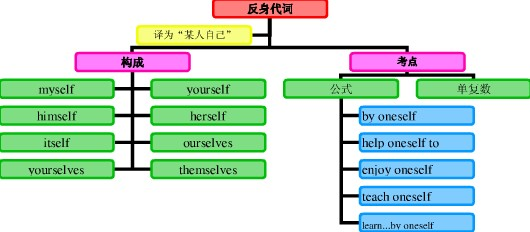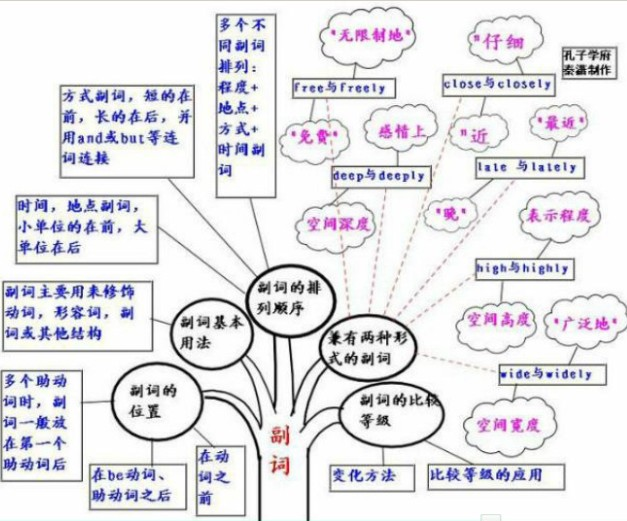本试题 “I should have to teach all subjects___ art, which he taught___.[ ]A. except; itB. except; himselfC. besides; itD. besides; himself” 主要考查您对反身代词
副词
等考点的理解。关于这些考点您可以点击下面的选项卡查看详细档案。
- 反身代词
- 副词
反身代词的定义:
反身代词是一种表示反射或强调的代词。它的基本含义是:
通过反身代词指代主语,使施动者把动作在形式上反射到施动者自己。因此,反身代词与它所指代的名词或代词形成互指关系,在人称、性别、数上保持一致。
反身代词的句法功能:
(1)用作同位语(加强被修饰词的语气,紧放在被修饰名词后,或句末):
如:The box itself is not so heavy.箱子本身并不重。
You yourself said so./ You said so yourself. 你自己是这样说的。
(2)用作宾语(动词或介词的宾语):
Take good care of yourself. 照顾好自己。
She could not make herself understood. 她不能使别人听懂她的话。
(3)用作表语:
The poor boy was myself. 那个可怜的孩子就是我自己。
The ones who really want it are ourselves. 真正想要它的是我们自己。
有时用于be, feel, seem, look 等后作表语表示身体或精神处于正常状态:
I'm not quite myself these days. 我近来身体不大舒服。
I'll be myself again in no time.我过一会儿就会好的。
(4)用作主语:
在现代英语中,反身代词一般不能独立用作主语,但是它却可以借助and,or,nor等连词与其他名词一起构成并列主语(且位于并列主语的后部),以及用于某些特殊结构(如as...as等):
My brother and myself went there yesterday.昨天我兄弟和我一起去了那儿。
Jim's sister and himself get up at six everyday.吉姆的妹妹和他每天6点起床。
He was as anxious as myself. 他和我一样担心。
反身代词人称、单复数对比:
|
|
单数 |
复数 |
|
第一人称 |
myself |
ourselves |
|
第二人称 |
yourself |
yourselves |
|
第三人称 |
himself |
themselves |
|
herself |
themselves | |
|
itself |
themselves |
反身代词的基本形式:
反身代词是oneself 根据所指词的人称、性别、单复数等的变化可以有myself, himself, herself, yourself, itself, ourselves, yourselves, themselves 等形式。
oneself 与 himself:
当one指人时,其相应的反身代词通常用oneself,在美国英语中也可用 himself:One should not praise oneself[himself].一个人不应该自吹自擂。
反身代词知识体系:

反身代词用法拓展:
1、反身代词不能做主语,但可作主语同位语,放在主语后或句末。
错:Myself went to the cinema.
对:I went to the cinema myself.
2、反身代词可以作宾语的同位语。如:You can go and ask John himself. 你可以去问约翰本人。
3、反身代词可以作介词的宾语,如:by oneself 全靠自己
She learnt swimming all by herself. 她是自学游泳的。
She said to herself,"Who am I?" 她自言自语的说:“我是谁?”
4、反身代词作动词的宾语。如:enjoy oneself 玩得高兴;help oneself (to) 随便用..... hurt oneself 伤害自己;
teach oneself 自学;get dressed oneself 自己穿衣。
副词的概念:
副词是指在句子中表示行为或状态特征的词,用来修饰动词、形容词、其他副词、介词短语、非谓语动词乃至整个句子,表示时间、地点、程度、方式等概念。
副词的位置:
1)在动词之前。
2)在be动词、助动词之后。
3)多个助动词时,副词一般放在第一个助动词后。
注意:
a. 大多数方式副词位于句尾,但宾语过长,副词可以提前,以使句子平衡。
如:We could see very clearly a strange light ahead of us.
b. 方式副词well,badly糟、坏,hard等只放在句尾。
如:He speaks English well.
副词的排列顺序:
1)时间,地点副词,小单位的在前,大单位在后。
2)方式副词,短的在前,长的在后,并用and或but等连词连接。
如:Please write slowly and carefully.
3)多个不同副词排列:程度+地点+方式+时间副词。
注意:副词very可以修饰形容词,但不能修饰动词。
改错:(错)I very like English.
(对)I like English very much.
注意:副词enough要放在形容词的后面,形容词enough放在名词前后都可。
如:I don't know him well enough.
There is enough food for everyone to eat.
There is food enough for everyone to eat.
兼有两种形式的副词:
1)close与closely:
close意思是“近”;closely意思是“仔细地”。
如: He is sitting close to me.
Watch him closely.
2)late与lately:
late意思是"晚";lately意思是“最近” 。
如:You have come too late.
What have you been doing lately?
3)deep与deeply:
deep意思是“深”,表示空间深度;deeply时常表示感情上的深度,“深深地” 。
如:He pushed the stick deep into the mud.
Even father was deeply moved by the film.
4)high与highly:
high表示空间高度;highly表示程度,相当于much。
如:The plane was flying high.
I think highly of your opinion.
5)wide与widely:
wide表示空间宽度;widely意思是“广泛地”,“在许多地方”。
如:He opened the door wide.
English is widely used in the world.
6)free与freely:
free的意思是“免费”;freely的意思是“无限制地”。
如:You can eat free in my restaurant whenever you like.
You may speak freely, say what you like.
副词知识体系:

与“I should have to teach all subjects___ art, which he taug...”考查相似的试题有:
- The meeting achieved _____ a short statement, leaving many details to be worked out later.[ ]A. other thanB. anything...
- (2013·大连24中模拟)Good health is the basis for students to ________ carry on with their studies and to do any other ...
- —Are you worried about the coming exam?—Only ______.A.graduallyB.broadlyC.slightlyD.extremely
- How ______ is it from the railway station to the museum?A.soonB.farC.longD.often
- 短文改错Dear Abby,How are you? I've got a wonderful news to tell you. I have offered a scholarshipat a university in ...
- 短文改错此题要求改正所给短文的错误。对标有题号的每一行作出判断:如有错误(每行只有一个错误),则按下列情况改正:该行...
- 短文改错。下面短文中有10处语言错误。请在有错误的地方增加、删除或修改某个单词。增加:在缺词处加一个漏字符号(∧),并在...
- He is ________that all of us like him very much.A.a boy so lovelyB.a such lovely boyC.so a lovely boyD.such a lov...
- When we got there, he was about to leave. So he only had time to explain _______ to us how he ________ our plan.A.im...
- — Do you think it's a good idea to make friends with your students?— _____, I do. I think it's a great idea.[ ]A. Rea...